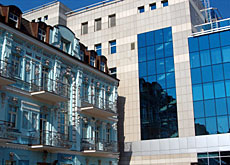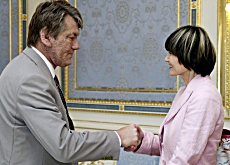Helping Ukraine make a fresh start

For the past decade Switzerland has been supporting the transition of Ukraine from a former Soviet satellite to a country with European Union ambitions.
By providing technical support and financial assistance, Switzerland aims to help improve living conditions and promote the sustainable management of resources.
Since it became independent in 1991, Ukraine (population: 50 million) has been trying to consolidate its links with the West, without breaking off relations with Russia, its principal trading partner.
This vast eastern European nation – a member of the Commonwealth of Independent States (CIS) – wants to rid itself of the cumbersome administration and economic apparatus inherited from the Soviet era and move towards a democratic society based on a free-market economy.
However, the transition has been anything but smooth. “Many public health indicators have deteriorated since the early 1990s, and in the year 2000 a quarter of the population was living below the poverty line,” said Walter Fust, director of the Swiss Agency for Cooperation and Development (SDC).
As part of its programme of aiding eastern European and CIS countries – a priority of Swiss foreign policy – the government has therefore decided to support the process of change in Ukraine, through various projects in the social, health, legal and financial fields.
Chernobyl Trauma
Before the social and political upheaval brought about by the collapse of the Soviet Union, Ukraine was the scene of a tragic event that has left deep scars on the country: on April 26, 1986, the explosion of reactor number four at the Chernobyl nuclear power station released a radioactive cloud which spread over much of Europe, contaminating the environment and harming human beings.
It is therefore on Chernobyl that Switzerland’s humanitarian aid efforts are focused. After providing public-health and psychological assistance, the SDC is now running projects in the area to rehabilitate local communities, as they struggle to live with the consequences of the disaster.
The great fear, however, is that events of this kind could be repeated, in Ukraine and in other Eastern European countries. This is why Switzerland is involved in international efforts to ensure greater nuclear security, with the State Secretariat for Economic Affairs (Seco) funding a number of projects to raise awareness and deal with these situations.
“In collaboration with the European Bank for Reconstruction and Development, we are contributing to two funds set up to improve the situation where atomic energy is concerned,” explains Davorka Rzehak, responsible for investment promotion at Seco.
“In the case of Ukraine, we are helping to renew the increasingly unsafe protective shield built around the Chernobyl reactor.”
Other Problems
Chernobyl is not Ukraine’s only serious problem. Recent political upheavals are evidence that the country’s institutions and civil society are undergoing a radical transformation.
It is the widely accepted view that a break with the old system – where lack of transparency and corruption is rife – can only be achieved by a process of reform. But the reforms are slow in coming.
To speed up the transition, and mitigate the effects of such radical change, the SDC is devoting an average of SFr6 million ($4.6 million) a year to consolidating judicial institutions, improving healthcare infrastructure and promoting the sustainable exploitation of natural resources.
In the prison at Bila Tserkva in the Kiev region, for example, the aim is to create a model institution, where ill treatment is a thing of the past and prisoners’ rights are respected.
In the eastern mountains of Transcarpathia, the SDC’s partners are promoting sustainable forest management, partly with a view to preventing natural disasters, in particular flooding.
Switzerland also had some influence on the most recent presidential elections won by the reformist Victor Yushchenko, by supporting a national information campaign on voting procedures.
Corporate governance
However, these efforts are not in themselves sufficient to ensure a better future for the former Soviet republic. Seco’s priority is the private sector, which, according to Rzehak, is “the principal engine of economic growth”.
In addition to improving the general framework by supporting legislation to protect investors, Seco’s objective is to facilitate access to finance for small and medium-sized enterprises (SMEs) and to support their development. To this end, Seco has devoted SFr40 million to Ukraine over the past ten years.
“We also insist on good corporate governance, as a way of introducing greater transparency and so attracting more investors,” says Rzehak.
These steps have not yet solved Ukraine’s real problem: the split between the western half of the country, which is looking increasingly to Brussels, and the eastern half, which still turns a nostalgic eye towards Mother Russia.
swissinfo, Luigi Jorio
In 2004, Switzerland contributed SFr9.7 million to cooperation projects in Ukraine.
The amount allocated for 2005 was SFr8.4 million.
Between 1994 and 2004, the total value of Switzerland’s development cooperation programme was SFr76.1 million.
In 1999, the SDC and Seco opened an office in Kiev.
Ukraine has 50 million inhabitants spread over 600,000 sq km, and has been independent since 1991.
In December 2004, the former pro-Russian president Leonid Kuchma was forced to hand over to the reformist Victor Yushenko after the “Orange Revolution”.
The country’s principal trading partner is still Russia, followed by Germany.

In compliance with the JTI standards
More: SWI swissinfo.ch certified by the Journalism Trust Initiative











You can find an overview of ongoing debates with our journalists here . Please join us!
If you want to start a conversation about a topic raised in this article or want to report factual errors, email us at english@swissinfo.ch.